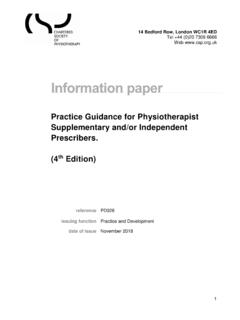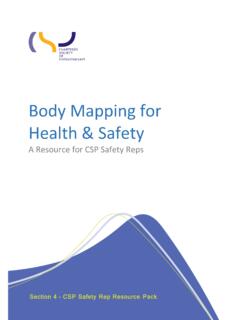Transcription of Musculoskeletal core capabilities - Chartered Society of ...
1 1 Musculoskeletal core capabilities framework for first point of contact practitionersPublic HealthEngland2 AcknowledgementsThis framework was commissioned by Health Education England and NHS England, building upon work previously undertaken by the national programme delivered by the Arthritis and Musculoskeletal Alliance (ARMA) and its member of the framework was steered by a project management group chaired by Professor Anthony Woolf (chair of ARMA) and informed by a Delphi research project led by Dr Mike Backhouse and Ken Chance-Larsen (University of Leeds) and by focus groups of patients. Project management was provided by Colin Wright and Hilary Wyles (Skills for Health).We are extremely grateful to members of the project management group for providing their guidance, expertise and support. In particular, assistance in refining the final draft was provided by Dr Richard Collier (Health Education England), Dr Sally Gosling ( Chartered Society of Physiotherapy), Dr Josephine Erwin (Royal Cornwall Hospitals NHS Trust), Dr Mike Backhouse and Ken Chance-Larsen (University of Leeds).
2 The project management group included representatives of the following organisations: Arthritis Action Arthritis and Musculoskeletal Alliance (ARMA) British Society of Rheumatology Chartered Society of Physiotherapy Health Education England Institute of Osteopathy National School of Occupational Health NHS England Public Health England Royal College of General Practitioners Royal Cornwall Hospitals NHS Trust Skills for Health University of Exeter University of Leeds University of Salford. British Association of Prothetists and Orthotists British Health Professionals in Rheumatology British Institute of Musculoskeletal Medicine British Orthopaedic Association British Society for Rheumatology Chartered Society of Physiotherapy College of Paramedics College of Podiatry Faculty of Sport and Exercise Medicine MSK:UK National Rheumatoid Arthritis Society NHS England Primary Care Rheumatology Society Royal College of Nursing Rheumatology Forum Royal College of Occupational Therapists Royal Pharmaceutical , we are grateful to the many other clinicians and service users who provided comments and feedback on the framework and particularly the 74 respondents to the wider online consultation survey.
3 Further detail of how the framework was developed is presented in Appendix addition, we would like to thank the expert representatives of the following organisations which participated in the Delphi exercise: 3 Equality and Health Inequalities Statement Promoting equality and addressing health inequalities are at the heart of our values. Throughout the development of the policies and processes cited in this document, we have: Given due regard to the need to eliminate discrimination, harassment and victimisation, to advance equality of opportunity, and to foster good relations between people who share a relevant protected characteristic (as cited under the Equality Act 2010) and those who do not share it; and Given regard to the need to reduce inequalities between patients in access to, and outcomes from healthcare services and to ensure services are provided in an integrated way where this might reduce health inequalities. Health Education England, NHS England and Skills for Health 2018 NHS England Publications Gateway Reference: 082896 Copies of this framework may be made for non-commercial purposes to aid workforce development.
4 Any other copying requires the permission of the ..05 Introduction and background ..06 Scope of the framework ..07 Structure of the is this framework for? ..09 Patient journey ..11 Professional values and behaviours ..13 MSK underpinning knowledge and skills ..14 Domain A. Person-Centred Approaches .. 1. Communication .. 2. Person-centred care ..17 Domain B. Assessment, Investigation and Diagnosis .. 3. History-taking .. 4. Physical assessment .. 5. Investigations and diagnosis ..20 Domain C. Condition Management, Interventions and Prevention .. 6. Prevention and lifestyle interventions .. 7. Self-management and behaviour change .. 8. Pharmacotherapy .. 9. Injection therapy .. 10. Surgical interventions .. 11. Rehabilitative interventions .. 12. Interventions and care planning .. 13. Referrals and collaborative working ..26 Domain D. Service and Professional Development .. 14. Evidence-based practice and service development ..27 Appendix 1. How the framework was developed.
5 28 Appendix 2. Principles of capability review ..29 Appendix 3. Indicative knowledge underpinning the capabilities ..30 Appendix 4. Glossary of terms ..34 Appendix 5. Delphi literature review reference list ..37 Appendix 6. Other supporting resources ..385 ForewordThe delivery of high quality Musculoskeletal (MSK) care and successfully meeting the increasing demands on healthcare services relies on developing a skilled and well-integrated multidisciplinary workforce. This capability framework aims to ensure that the range of health professionals who provide care for people with MSK problems are equipped to consistently deliver person-centred care, can play a full role in helping to manage problems appropriately at the first point of contact and help towards achieving better outcomes across the system. The first point of contact is important to ensure that potential emergencies are recognised and that the next step in the pathway occurs seamlessly and as efficiently as possible.
6 Working in a team and sharing challenges, first contact MSK practitioners can ensure the person with an MSK problem gets rapid access to the right making it clear what capabilities are required we hope the framework will encourage training and development to increase the number of practitioners from different professions to fulfil this vital role. Importantly, this is not about creating a new MSK workforce, but is about recognising existing capabilities within practitioners scope of practice and ensuring services are delivered consistently by multi-professional statement of core capabilities offers employers, clinicians, regulators, primary care training hubs, commissioners and practitioners themselves clear definitions against which to improve and assure, and offers the public assurance of the capabilities of the wider primary care framework also offers the opportunity to modernise skill sets and to ensure that person-centred approaches are central to service transformation for example skills to support shared decision-making, health coaching, social prescribing and prevention; working in partnership with people to maximise early recovery, support self-management and enable people to stay active and independent.
7 The framework has been developed by representatives from the whole MSK sector, and includes feedback from several focus groups with people with lived experience of MSK problems, collaborating on an issue we all agree is important. Implementation of this framework will enable assurance of patient safety, help to deliver the benefits of earlier intervention and support the national service changes within primary care and beyond. We believe that this will make a real difference to health outcomes for people with MSK problems and we commend the framework to Peter KayNational Clinical Director for Musculoskeletal Services, NHS EnglandProfessor Anthony D WoolfChair of ARMA (Arthritis and Musculoskeletal Alliance)Professor Simon GregoryDirector of Education and Quality, Health Education England (HEE)Suzanne RastrickChief Allied Health Professions Officer (England), NHS England6 Introduction and backgroundHealth Education England and NHS England commissioned the development of this Musculoskeletal (MSK) core capabilities framework in order to support the improvement of services, placing skilled MSK practitioners earlier in patient pathways.
8 The aim is to ensure expert diagnosis, prevention, supported self-management advice, early treatment and onwards referral, where needed, is available to anyone presenting with an MSK condition. It meets the needs and wishes of people with MSK conditions, identified through focus health professionals (such as GPs and physiotherapists) will already be working in accordance with these capabilities , while for others the capabilities will provide a framework for continuing professional development. The framework sets out a standard for consistent, safe and effective practice across a range of practitioners working as part of a multi-professional team. This includes a range of settings, including primary and community care, emergency care or occupational health services. This framework supports the implementation of the NHS England-supported first contact practitioner model of care into service conditions are the single biggest cause of the growing burden of disability in the UK1.
9 Much of the disability is avoidable. They have an enormous impact on the quality of life for millions of individuals in the UK with the third worst quality of life impact after neurological conditions and mental health, as reported in the NHS GP survey (2015). MSK conditions account for 30% of GP consultations in England2 and are associated with related co-morbidities, including diabetes, depression and obesity. They account for billion NHS spending each year3. Early management keeps people at work or enables them to return to work more quickly, reduces downstream treatment needs and optimises recovery. This framework will help healthcare professionals to address some of these challenges. Drivers for development of the framework include policy ( GP Forward View), the duty to reduce health inequalities in access to services and health outcomes and the national work programme delivered by the Arthritis and Musculoskeletal Alliance (ARMA) and its member organisations, working in partnership with NHS England, with the National Clinical Director for MSK Services and the Elective Care Transformation Programme.
10 This national work programme includes work-streams designed to support improved communication across the healthcare sector, a more robust approach to what good looks like (and how we measure it) and ultimately improved outcomes for individuals with MSK conditions. This includes oversight by the MSK Workforce Group, building on their previous work. In setting out the capabilities required of practitioners acting as a first point of contact for MSK conditions, the framework provides clarity both on the standards expected of first point of access MSK service delivery, and the knowledge, skills and behaviours that practitioners need to develop and demonstrate. The framework recognises that practitioners will acquire the capabilities through their pre-and post-registration education (at undergraduate and postgraduate levels) and as their learning and professional development progresses. It should inform how curricula are developed, updated and implemented (including in ways that strengthen inter-professional learning), and how learning is assessed.













